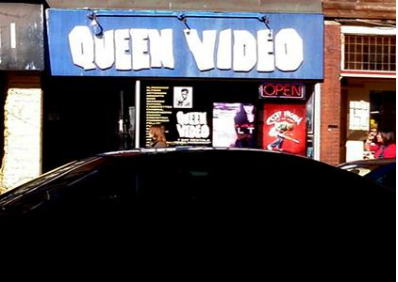By Lindsay Blair Goeldner

Previously: Sundance 2014 — a Microcosm of a Greater Divides
At Indie Street we are holding on to all hope that the interpersonal human elements of storytelling will never fade away into obsoleteness. The following piece comes from one of Indie Street’s own curators. While she is not programming a film festival or being one of the coolest computer programming chicks in the game, Lindsay finds time to work at one of the last Indie Video Rental Stores in Canada. Who better to get a street level breakdown about the effects of technology on film consumer’s behavior…Enjoy!
 The death of the indie video store is imminent. At least that’s what everyone tells me. Working as a video store clerk in one of a handful of stores (Queen Video) in Toronto is both a blessing and a burden. While the job remains interesting, I’m continually receiving remarks about how great it is that we’re still open. In the wake of the Blockbuster collapse, the independent video store flourished. Business seemed better than usual around late 2011 when the last Blockbusters were closing down in Canada. At that point in time, Netflix had already arrived, and streaming was still popular, but for some reason many people did not want to let go of the video store experience.
The death of the indie video store is imminent. At least that’s what everyone tells me. Working as a video store clerk in one of a handful of stores (Queen Video) in Toronto is both a blessing and a burden. While the job remains interesting, I’m continually receiving remarks about how great it is that we’re still open. In the wake of the Blockbuster collapse, the independent video store flourished. Business seemed better than usual around late 2011 when the last Blockbusters were closing down in Canada. At that point in time, Netflix had already arrived, and streaming was still popular, but for some reason many people did not want to let go of the video store experience.
Our store’s customers range from our regular cinephiles to young families that are excited to show their children what a video store is. Even my great store seems close to its end, but an anomaly of a customer that came in recently re-assured me that the spirit of the Indie Video Store will never perish. Humans like interaction with each other, especially when it is “cool”. This customer was a teenage boy who rented a Fellini film. Now, I’m usually hesitant to mention the dreaded streaming site Netflix in the store, but after telling me he had just gotten into “old Italian movies” I had to ask what brought him in. The answer was simple: “Going to the video store is cool. My friends all download but they’re missing out.” This young trend re-setter inspired me to think about what has made the video store experience a popular one, and likewise what the future of film renting should try to preserve…so I have narrowed it down to two crucial factors:
1. The Inherent “Cool” Factor of the Video Store.
Coolness is indeed a reason older technology comes back to life. The resurgent popularity of vinyl is embodied by way of the expanding independent vinyl shops around the city. Vinyl-enthusiasts, who may easily download the same content online, brandish their title as “collector” like a badge on their chest. They may argue the sound quality is better than digital or that they’re expanding on their already well-established collection, but either way, they could have opted to download and yet, they don’t.
Video rental is a little different; no one claims ownership or is excited to tell you about their invoice history at the rental store. Instead, there is something inherently cool about going back to the video store while everyone else stays cozy and warm in their apartments scrolling through Netflix or downloading content online. I like to think of current video renters as cultural purveyors of an era that has passed as they help keep in place a system others have long forgotten. It’s outdated, sure, but because of this it’s also not mainstream and hence, cool.
As the last physical video stores prepare close their doors, these cool video renters like the Fellini teen will not just disappear, they need a new cool place to congregate outside of Netflix and Hulu. Highly curated online film platforms like IndieStreet and others will help to fill this gap, but these platforms need to be extremely conscious of being more “cool” than Netflix, and more importantly they need to remember critical factor #2.
2. The Human Advantage
Algorithms on YouTube and Netflix recommend titles based on the user’s previous picks, but can never come close to the recommendations of a human who has similar tastes. These algorithms keep in the general theme of the user’s preferences but can not figure out the nuances of human likes across genres. On top of that they often point out other selections that are big-budget Hollywood flicks or syndicated television series. These systems look at keywords and umbrella terms in describing the body of films a user selects so the choices remain in the mainstream. A video store clerk, on the contrary, will most often point a customer in the direction of something less well known, a hidden gem that once exceeded their personal expectations. Quite often that is precisely what customers are asking for; they want a hand picked film experience that can create a personal connection with the curator and give them something to discuss with their friends.
As great as an online suggested pick might be, it can never top a recommendation from someone who loves film and loves to talk about it. I’m frequently caught up in conversations with customers about a great Danish television series they just finished, or a French film they loved. These are the times I often forget that I’m working. The human interaction of talking to a video clerk is precisely what made me want to work there, and now what makes me interested in helping the next generation of the online Indie video store. I’ll never forget sifting through film cases as a kid in Movie Village in Winnipeg. I would be looking at the horror film titles my mother would never let me rent, and I distinctly recall a clerk telling me how great Sleepaway Camp is as they walked by (much to the chagrin of my mom).
When discussing this article concept, I asked Jay Webb how he thinks IndieStreet can retain the “cool” and the “human advantage” of the Indie video store that we have come to adore:
“First, I do think there is still hope for a physical video store if someone like you comes along and incorporates tech or event elements into the model. My hope for this lies mostly in the fact that kids never want to have the same interests as their parents. Mom is on facebook, maybe I will go hang out with my friends instead of chatting online. I have heard a rumbling of teenagers who are going anti-social networking so maybe the next generation actually will continue to experience human contact.
As far as IndieStreet goes, I think the cool factor will hopefully happen organically by only selecting cool and innovative filmmakers into our group. Our newest member, Sean Dunne (won Tribeca award for best new documentary director in 2013), has upped the cool factor to a level I am having trouble keeping up with…As far as the human factor, IndieStreet will be focusing on community events and screenings, connecting customers to the filmmakers throughout the process, and all of the selected films we will feature on our site will also be curated by a passionate group of humans. But we are open to suggestions.”
As Jay paraphrased, generational cycles prove that trends and technologies that were once popular will be so again in a few years time, so one may hope that video stores reappear as a nostalgic encounter. If they are doomed, I think Netflix, Hulu, IndieStreet, and other streaming sites could really benefit from finding a way to interject the “coolness” and human element the video store has within their system. Therein lies a negotiation between old and new, and the cycle of trends would become conflated.
It remains to be seen if an online streaming site can become cool in the way the rental store is or if they can really integrate a human element in recommending content without being face to face. I don’t have the answers, but if this article helps IndieStreet figure it out, I expect a larger profit share! – thanks.





